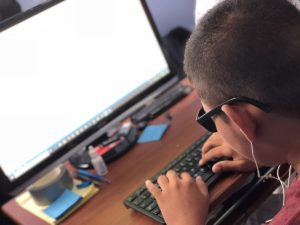Join a powerful, unprecedented alliance for better eye health for all.
Join IAPB-
Choose an alternate language here
For more than 40 years, The Belize Council for the Visually Impaired (BCVI) has been providing eye services throughout the country of Belize. What started as a small branch of the Red Cross in 1981 providing rehabilitation support for people who were blind, BCVI has since successfully developed a range of services that support the needs of blind and visually impaired people whilst also actively working to prevent eye problems that can lead to blindness.

Through the Primary Eye Care System, patients are seen by the optometrist and are given prescription glasses, if necessary. Should the doctor find a deeper problem, the patient is then referred to the Secondary Eye Care Clinic, where the ophthalmologist examines him or her. Here, the patient can receive the appropriate medication as well as surgery, if necessary.
Not all eye problems can be treated; therefore, our services go beyond the doctor’s office and into the clients’ classrooms and/or homes, through our Education & Rehabilitation Programmes.
The Education Programme prepares the child for classes by providing material for school as well as emotional support. This department at BCVI goes hand-in-hand with the Rehabilitation Programme in which trained staff members work with the clients in their daily environments to help get them accustomed to their surroundings in order to live more independently. This programme also involves the family members & friends who are trained in dealing with the client’s situation.
Along with working in their homes, we also assist our clients in seeking employment through our Job Placement & Employment Support Programme. We also offer extracurricular activities for our older clients, the Visually Impaired Club.
Whether a person is born blind or develops vision loss later in life, whether they are visually impaired or blind, we cater to all our clients’ needs and we work to ensure that no one is left without an option or an opportunity.
As the only non-private national provider of comprehensive eye care, we have positively impacted the lives of hundreds of thousands of Belizeans through the provision of eyeglasses, cataract surgery and glaucoma medication (to name a few). Of particular note is our collaboration with the Maternal and Child Health Unit in the Ministry of Health and the national emergency hospital (KHMH) which houses the country’s only NICU. With support from international paediatric Ophthalmologists who have provided several educational sessions on the prevention of ROP, we have drastically reduced the numbers of children diagnosed with this condition since the 2000s.
Over the span of our 40 years of existence, BCVI has supported more than 1,600 Belizeans who are irreversibly blind or have severely low vision. Ages range across the lifecycle, from birth to the golden years.
Without access to eye care in the government sector and high costs associated with private care, BCVI continues to be the most affordable and accessible option in eye care throughout Belize examining more than 20,000 patients in our primary and secondary clinics annually. Our services are far-reaching with base clinics strategically located in each District, and our teams of Optometrists and Assistants (and international volunteers) provide outreach clinics to more remote areas of the country.
In joining IAPB we look forward to learning from our regional and international partners in eye care as well as sharing our decades-long experience in the prevention of blindness, restoration of sight and in rehabilitation and education support for those who are irreversibly blind. Together we can truly help reduce the incidence of avoidable blindness, globally.